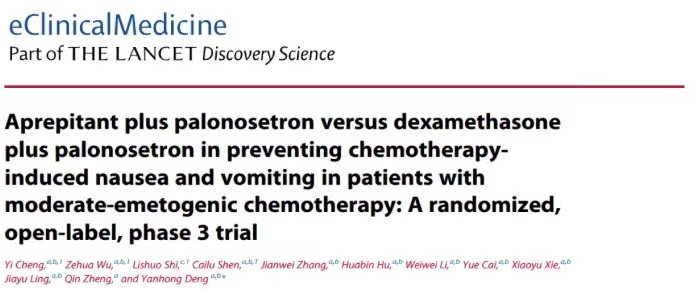Nausea and vomiting are the most prevalent side effects of antineoplastic therapy. Despite significant progress in the prevention of chemotherapy-induced nausea and vomiting (CINV) by using dexamethasone combined with palonosetron for patients who received moderate-emetogenic chemotherapy (MEC), some of these patients still suffer from CINV.
Recently, a medical team led by Professor Deng Yanhong from the Department of Medical Oncology, the Sixth Affiliated Hospital of Sun Yat-sen University published their study results of evaluating whether aprepitant combined with palonosetron can improve the efficacy in the prevention of CINV in patients receiving MEC on eClinicalMedicine.

(Photo provided to Newsgd.com)
The team has proven that for colorectal cancer patients receiving (MEC) FOLFOX (a combination chemotherapy used to treat colorectal cancer) regimen, the combination of aprepitant with palonosetron significantly improves antiemetic efficiency than the combination of dexamethasone with palonosetron.
The study was the first randomized, phase III study to compare aprepitant plus palonosetron versus dexamethasone plus palonosetron for the prevention of CINV in MEC.
Between Sep 1, 2017, and Oct 23, 2019, 320 patients were enrolled. Participants were randomly assigned in a 1:1 ratio to receive either dexamethasone or aprepitant plus palonosetron before chemotherapy, and 315 patients were evaluated. The data from 315 patients (160 in the aprepitant group and 155 in the dexamethasone group) were analysed.
The proportion of patients who achieved complete response (CR) was significantly higher with aprepitant than that noted with dexamethasone in the overall phase and in the delayed phase. No significant difference of CR rate was observed in the acute phase. In the overall phase, the incidence of insomnia, dyspepsia, and flushing reported by the patients was significantly higher in the dexamethasone group than that in the aprepitant group.
Professor Deng pointed out that the study results are not only beneficial to improve levels of comfort of patients during chemotherapy, but also
a clinically meaningful improvement when deciding MEC regimen. Along with the rise of immunotherapy, especially in immunotherapy combined with chemotherapy, this study suggests that the antiemetic regimen to replace dexamethasone is of great significance.
Source | The Sixth Affiliated Hospital of Sun Yat-sen University
Editor | Wing, Nan, Abby, Hannah, Jerry
















